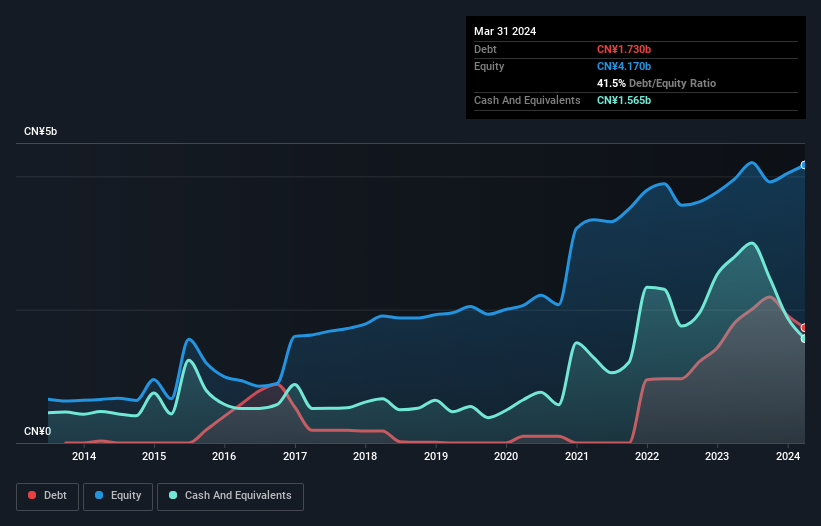Shanghai Bairun Investment Holding Group (SZSE:002568) Seems To Use Debt Quite Sensibly

Warren Buffett famously said, 'Volatility is far from synonymous with risk.' It's only natural to consider a company's balance sheet when you examine how risky it is, since debt is often involved when a business collapses. We note that Shanghai Bairun Investment Holding Group Co., Ltd. (SZSE:002568) does have debt on its balance sheet. But should shareholders be worried about its use of debt?
When Is Debt Dangerous?
Debt is a tool to help businesses grow, but if a business is incapable of paying off its lenders, then it exists at their mercy. Part and parcel of capitalism is the process of 'creative destruction' where failed businesses are mercilessly liquidated by their bankers. However, a more frequent (but still costly) occurrence is where a company must issue shares at bargain-basement prices, permanently diluting shareholders, just to shore up its balance sheet. Of course, debt can be an important tool in businesses, particularly capital heavy businesses. The first step when considering a company's debt levels is to consider its cash and debt together.
Check out our latest analysis for Shanghai Bairun Investment Holding Group
How Much Debt Does Shanghai Bairun Investment Holding Group Carry?
The chart below, which you can click on for greater detail, shows that Shanghai Bairun Investment Holding Group had CN¥1.73b in debt in March 2024; about the same as the year before. However, it also had CN¥1.57b in cash, and so its net debt is CN¥164.5m.

How Strong Is Shanghai Bairun Investment Holding Group's Balance Sheet?
We can see from the most recent balance sheet that Shanghai Bairun Investment Holding Group had liabilities of CN¥1.82b falling due within a year, and liabilities of CN¥1.10b due beyond that. Offsetting this, it had CN¥1.57b in cash and CN¥217.9m in receivables that were due within 12 months. So it has liabilities totalling CN¥1.14b more than its cash and near-term receivables, combined.
Of course, Shanghai Bairun Investment Holding Group has a market capitalization of CN¥19.2b, so these liabilities are probably manageable. Having said that, it's clear that we should continue to monitor its balance sheet, lest it change for the worse. But either way, Shanghai Bairun Investment Holding Group has virtually no net debt, so it's fair to say it does not have a heavy debt load!
In order to size up a company's debt relative to its earnings, we calculate its net debt divided by its earnings before interest, tax, depreciation, and amortization (EBITDA) and its earnings before interest and tax (EBIT) divided by its interest expense (its interest cover). Thus we consider debt relative to earnings both with and without depreciation and amortization expenses.
Shanghai Bairun Investment Holding Group has a low net debt to EBITDA ratio of only 0.15. And its EBIT covers its interest expense a whopping 251 times over. So you could argue it is no more threatened by its debt than an elephant is by a mouse. Another good sign is that Shanghai Bairun Investment Holding Group has been able to increase its EBIT by 29% in twelve months, making it easier to pay down debt. When analysing debt levels, the balance sheet is the obvious place to start. But ultimately the future profitability of the business will decide if Shanghai Bairun Investment Holding Group can strengthen its balance sheet over time. So if you're focused on the future you can check out this free report showing analyst profit forecasts.
Finally, a company can only pay off debt with cold hard cash, not accounting profits. So we always check how much of that EBIT is translated into free cash flow. Over the last three years, Shanghai Bairun Investment Holding Group recorded negative free cash flow, in total. Debt is usually more expensive, and almost always more risky in the hands of a company with negative free cash flow. Shareholders ought to hope for an improvement.
Our View
Shanghai Bairun Investment Holding Group's interest cover suggests it can handle its debt as easily as Cristiano Ronaldo could score a goal against an under 14's goalkeeper. But we must concede we find its conversion of EBIT to free cash flow has the opposite effect. When we consider the range of factors above, it looks like Shanghai Bairun Investment Holding Group is pretty sensible with its use of debt. That means they are taking on a bit more risk, in the hope of boosting shareholder returns. The balance sheet is clearly the area to focus on when you are analysing debt. However, not all investment risk resides within the balance sheet - far from it. These risks can be hard to spot. Every company has them, and we've spotted 2 warning signs for Shanghai Bairun Investment Holding Group (of which 1 is concerning!) you should know about.
At the end of the day, it's often better to focus on companies that are free from net debt. You can access our special list of such companies (all with a track record of profit growth). It's free.
If you're looking to trade Shanghai Bairun Investment Holding Group, open an account with the lowest-cost platform trusted by professionals, Interactive Brokers.
With clients in over 200 countries and territories, and access to 160 markets, IBKR lets you trade stocks, options, futures, forex, bonds and funds from a single integrated account.
Enjoy no hidden fees, no account minimums, and FX conversion rates as low as 0.03%, far better than what most brokers offer.
Sponsored ContentNew: Manage All Your Stock Portfolios in One Place
We've created the ultimate portfolio companion for stock investors, and it's free.
• Connect an unlimited number of Portfolios and see your total in one currency
• Be alerted to new Warning Signs or Risks via email or mobile
• Track the Fair Value of your stocks
Have feedback on this article? Concerned about the content? Get in touch with us directly. Alternatively, email editorial-team (at) simplywallst.com.
This article by Simply Wall St is general in nature. We provide commentary based on historical data and analyst forecasts only using an unbiased methodology and our articles are not intended to be financial advice. It does not constitute a recommendation to buy or sell any stock, and does not take account of your objectives, or your financial situation. We aim to bring you long-term focused analysis driven by fundamental data. Note that our analysis may not factor in the latest price-sensitive company announcements or qualitative material. Simply Wall St has no position in any stocks mentioned.
Have feedback on this article? Concerned about the content? Get in touch with us directly. Alternatively, email editorial-team@simplywallst.com
About SZSE:002568
Shanghai Bairun Investment Holding Group
Shanghai Bairun Investment Holding Group Co., Ltd.
Excellent balance sheet and fair value.
Market Insights
Community Narratives



